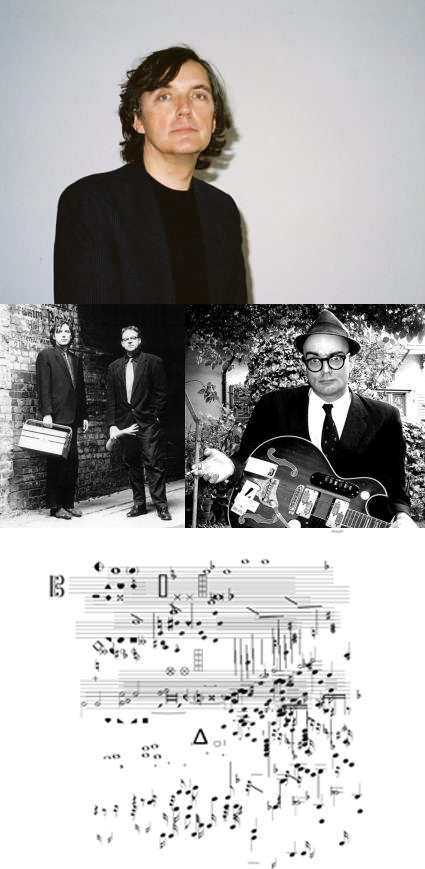Saturday, 03 November, 2018 - 21:30
Michael Renkel / Activity Center + Mat Pogo
Burkhard Beins
Michael Renkel
Burkhard Beins
Mat Pogo
Miako Klein
Johnny Chang
Emilio Gordoa
Rieko Okuda
Michael Renkel: Nomos Alto
Miako Klein – recorder
Johnny Chang – violin
Emilio Gordoa – vibraphone
Rieko Okuda – piano
Activity Center + Mat Pogo
Burkhard Beins – percussion and strings
Michael Renkel – strings and percussion
Mat Pogo – voice
biegungen im ausland dedicate this evening to the work of guitar player and composer Michael Renkel. He was a core member of the first Berlin Echtzeitmusik generation and long time organizer of the legendary concert series 2:13 Club and Quiet Cue. Michael Renkel is featured as an improviser (with Activity Center) as well as a composer, presenting his moving graphic score Nomos Alto.
Activity Center & Mat Pogo
Over the course of the last three decades Burkhard Beins’ and Michael Renkel’s duo Activity Center has developed a unique style of musical performance. Their distinctive way to “create spontaneous compositional structures” has been described as improvised sound art or hand-played musique concrète. – “Beins and Renkel’s fractured instrumentation ... rocks out to a scattered beat of madness, joy and sheer bedlam.” (The Wire)
Vocalist extraordinaire Mat Pogo is best known for his work with Jealousy Party, one of the most advanced musical units in Italy, mixing with personal touch soul, improv, avant rock, noise and error music. He has developed a fully integrated sound world of live and sampled voice fragments. In collaboration with Activity Center he is focusing on the pure acoustic potential of his voice.
Nomos Alto is a moving graphic score for flute, violin, vibraphone and piano, here interpreted by Miako Klein, Johnny Chang, Emilio Gordoa and Rieko Okuda. It is based on Michael Renkel’s thoughts on semiotics and the semiosphere:
“I perceive the outside world surrounding me as an unforeseen self-motion of the ‘projection surface: world’; symbols as results of thinking, consciousness or interpretation not as their prerequisite. Signs as reduction and attempt of objectification in a generally flowing movement. As a consequence of this thought experiment, the composition Nomos Alto is created. The score starts to change and thus refuses a traditional interpretation, since the sign system has already developed and changed during the interpretation process and reacts – metaphorically – to an intertextuality. Text (score) and interpretation become virtually indistinguishable. In the triad: system of signs (score) – object (work) – interpretation, the score is initially a seemingly certain tangible materiality. The performance refers only in a limited way to the work, as there are potentially infinite interpretations: Different interpreters relate to previous interpretations and thus to the relationship between work and score. Previous performances become the ‘sign’ of this new ‘object’, the semiotic process becomes an endless web of relations. The understanding of the work of art is moving, becomes more vulnerable, more unfathomable, brings the process into motion, but is always an initiation point on the interpretation. Apart from the practical interpretation, only ink and paper exist. The play of interpretation does not only include the preceding interpretations, but also other influences, including non-musical ones; a whole ‘encyclopedia’ (*1) of influences. This also happens in a compositional process! A web of references – composition and interpretation approach each to each other by becoming an intertext. ‘As one can now assume, in reality there are no sign systems that function completely precisely and functionally unambiguously on their own. (…) They only function because they are integrated into a certain semiotic continuum, which is filled with semiotic structures of different types, which are at different organizational levels. We want to call such a continuum (…) a semiosphere.’ (*2)
Background knowledge, experience, influences, analysis and cultural phenomena are inseparably interwoven. Fading out intertextuality and a (violent) reduction of the musical text to seemingly objective conditions reduces the wealth of possibilities. However, any statement is interpretation. Text and interpretation are indistinguishable. This calls into question the concept of repeatability at least: instead, there is an exciting perspective: the inevitable interaction of text and interpretation can create additional sense and new possibilities.
(*1) Umberto Eco: Semiotica e filosofia del linguaggio, Torino 1984, 55–140
(*2) Jurij M. Lotman: Über die Semiosphäre, in: Zeitschrift für Semiotik 12 (1990), Heft 4, 288“
Michael Renkel, born in north Germany, is based in Berlin since 1996. Renkel studied classical guitar in Hamburg. The main emphasis of his work is an interest in open methods of composition and the impossibility of repeating. His guitar playing straddles tradition and the development of a personal language that includes extended playing techniques and the preparation of the acoustic guitar. In a logical continuation he also extends the instrument via computer technology and he’s the first classical guitarist who connected the instrument in realtime-live processing to the computer. The acoustic guitar is modified in a way that blurs the delineation between acoustic preparation and electronic variance.
In his works the instrumental material is altered in realtime using preparations, laptops, MAX/MSP, percussion instruments, a 16 channel sampler-sequencer, synthesizers and a vibraphone, the further development of this setup is his self-constructed amplified stringboard.
Renkel also works with field recordings and composes works that experiment with genetic processes via generation, mutation, hybridization and coding also video animated compositions in which the performers interpret a permanently changing score in a live situation.
As “Greekeeper in a Shadow Meadow” he also works on video projects as an actor and musician. His compositions are published at Verlag Neue Musik / Berlin.
Supported by Senatsverwaltung für Kultur und Europa and Konzert des Deutschen Musikrates
Presented by Digital in Berlin
Doors: 8.30 pm
Concert start: 9.00 pm



As part of the series biegungen im ausland
